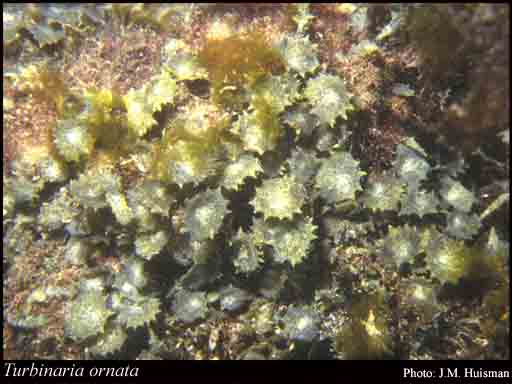- Reference
- Spec.Gen.Ord.Alg. 1:266 (1848)
- Conservation Code
- Not threatened
- Naturalised Status
- Native to Western Australia
- Name Status
- Current

Scientific Description
Habit and structure. Thallus to 30 cm tall; axes erect simple or branched. Laterals, including stalk, 7–21 mm long, 5–21 mm wide, usually dentate and with a large central vesicle crowned by occasional coarse erect teeth. Stalk terete to angular, 0.5–1.0 mm diam. at the base, thickening towards the apex. Some plants with flattened laterals and stalks; vesicle vestigial and margins entire, resembling the shape of a gingko leaf. Inflorescences 3–9 mm long, arising in the basal third of the vesicle, with racemose receptacles 1–4 mm long, terete with rounded apices.
Distribution. Widespread in tropical seas. In W.A. known from the tropics south to the Houtman Abrolhos Islands.
Habitat. Epilithic in the intertidal and shallow subtidal.
[After Dixon & Huisman, Algae of Australia: Mar. Benthic Algae of North-western Australia, 1. Green and Brown Algae 273 (2015)]
Distribution
- IBRA Regions
- Dampierland, Northern Kimberley, Pilbara.
- IBRA Subregions
- Mitchell, Pindanland, Roebourne.
- IMCRA Regions
- Abrolhos Islands, Kimberley, Ningaloo, Pilbara (nearshore), Pilbara (offshore).
- Local Government Areas (LGAs)
- Ashburton, Broome, Carnarvon, Cocos Islands, Derby-West Kimberley, Exmouth, Greater Geraldton, Karratha, Wyndham-East Kimberley.